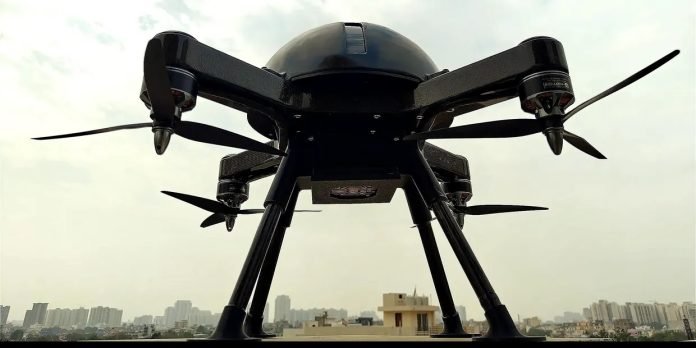New Delhi. vajR, a fully autonomous hard-kill drone interceptor system designed to take down hostile UAVs in real-time has been unveiled by Gurugram-based deep-tech startup Sharang Shakti. This is also one of the first attempts by an Indian private firm to deliver a reusable, AI-enabled kinetic drone defence platform, particularly tailored for modern aerial threats.
Unlike traditional counter-drone systems that rely on soft-kill methods like jamming or spoofing, vajR is built for kinetic elimination. It launches automatically from a dedicated autonomous hangar, receives targeting data from radar or optical sensors, and then flies toward the hostile drone. Using onboard sensors and neural networks, vajR identifies and locks on to its target in mid-air, before physically colliding with it to neutralise the threat.
This hard-kill approach is especially valuable in high-threat zones where soft-kill techniques may fail due to signal interference or latency.
What makes vajR unique is not just its capability—but the indigenous technology used in its manufacturing. The system has been designed entirely in-house by Sharang Shakti, from the control software and avionics to the sensor fusion and onboard AI. At the core of vajR lies Sharang Shakti’s own guidance and control system. It enables precise manoeuvring at high speeds, even during complex engagements with agile enemy drones.
Once within 50–100 meters of the target, vajR switches from remote guidance to its internal targeting system. Using a forward-looking electro-optical/infrared (EO/IR) sensor and a deep learning model trained on thousands of drone profiles, it performs autonomous target recognition, tracking, and engagement.
Upon target lock, the drone executes a full-speed collision. Critical components are housed in a Kevlar-reinforced dome, allowing vajR to survive and return safely—making it reusable, unlike many interceptors that are destroyed in action. Further, vajR is designed to operate in coordinated swarms, enabling multiple interceptors to work together against large drone formations.
The ground module houses and maintains vajR units. These hangars can autonomously charge, launch, and recover the drones without human intervention—allowing for round-the-clock readiness.
vajR comes into operation with the detection of a suspicious aerial object by a radar or an optical system. This data is sent to the vajR ground station, which then deploys the interceptor. During flight, it is guided by an AI-enhanced control system until it switches to its own onboard sensors for terminal guidance. The system includes a “human-in-the-loop” safeguard, allowing an operator to abort the mission at any point before impact.
Sharang Shakti’s broader vision is “from India, for global” and vajR reflects that ambition. The system is modular, scalable, and has applications across defence, critical infrastructure, and even civilian drone monitoring.
The unveiling of vajR is more than just a product launch—it reflects India’s evolving defence-industrial ecosystem. As a private player, Sharang Shakti represents a new wave of defence tech startups that blend deep engineering with real-world military utility. vajR with its smart design, indigenous development, and battlefield relevance, could soon become a core part of India’s counter-UAS doctrine. Overall, vajR offers a decisive, homegrown answer—fast, intelligent, and deadly.






